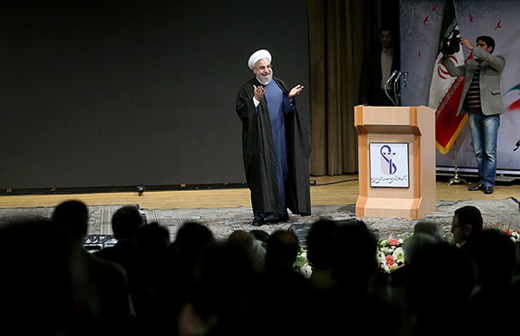In a ceremony to mark University Student Day on Sunday, President Hassan Rouhani made a speech at Shahid Beheshti University of Medical Sciences. December 7 marks the anniversary of the murder of three Tehran University students in 1953 at the hands of police during the Pahlavi rule.
Cancelation of speeches by a number of government critics in different universities made headlines. Among other, the speeches of Hossein Shariatmadari, the managing editor of Kayhan [a daily], Mahmoud Nabavian, a Tehran principlist MP, Hassan Abbasi, the head of the Center for Doctrinal Strategic Studies at the Islamic Revolution Guard Corps (IRGC), Payam Fazlinejad, a once reformist journalist who later broke ranks with reformists, and Hamid Rasaei, a principlist MP and a staunch supporter of former President Ahmadinejad, were called off.
In another development, three major university student bodies released separate letters, saying they were not attending President Rouhani’s speech, citing the fact that no time was dedicated to them to express their ideas before the president. The Student Basij Organization, affiliated to the Islamic Revolution Guard Corps, boycotted the ceremony too. The following is the translation of part of President Rouhani’s comments Fararu news website reported:
Student movement is an anti-colonialist movement
December 7 was the beginning and a turning point in the student movement which is not confined to political parties and factions. In fact, it amounts to the presence of all university students on cultural and political fronts. This anti-colonial movement is all for independence, freedom, patriotism and the battle against any form of injustice.
The government comes under all manner of criticism, but it welcomes critique
University students have to be critiques who act like observers who oversee things. And if students are not allowed to speak their mind elsewhere, they should be allowed to direct their criticism at the government.
The government comes under fire for issues ranging from tomatoes to nuclear energy. The government takes pride in welcoming sympathetic and unbiased critiques. We cannot make headway without critiques, because critique, research and science are the two sides of the same coin.
Students should not be indifferent to the environment
Students should not be nonchalant about social matters, nor should they be indifferent to issues related to water [resources], the environment, energy, status of software development [in the country], social ills and cultural issues.
We cannot live in a country and be indifferent to the matters which could influence the fate of our community, our nation and our region. In our country, ballot boxes are the basis of legitimacy which we cannot abandon; rather we should safeguard them.
The government does not seek a vote of confidence by wheeling and dealing
In the world we live in today we cannot claim that world affairs do not concern us or that we don’t care about public opinion and others’ judgment. [I cannot say that] I do not care what the university thinks when I am appointing a university official. Nor should I pick a minister and lobby influential figures to get him a vote of confidence and then have him at the helm of the ministry. That’s not the way this government does business.
From the get-go, the government has sought expert advice on all technical fronts. I am ever so glad that throughout the [prolonged] introduction of nominees [to secure parliamentary confirmation for minister of science], a poll was carried out that indicated university students and professors approve of the approach the 11th government has taken in running the universities.
The government is consistent in its approach toward universities and won’t backpedal. The new minister of science will pick up where his predecessors in the 11th government left off. Minister of Science Mohammad Farhadi will go down the same path that was supposed to be taken by Ja’far Nili-Monfared [Rouhani’s pick for the ministry who was rejected by parliament] and Ja’far Tofighi [the acting science minister] who were not allowed [to stay on the job].
We won’t break the promises that we’ve made
Our path is still the same one that we promised to you on day one. We won’t break the promise that we’ve made. Today, we are going down a path that requires the contribution of everyone. We should join hands to address our issues within and beyond our national borders.
Hotels across the country are packed with tourists
Today, the position of Iran in the eyes of world nations and politicians is totally different from what it used to be. People across the world have trust in the secure atmosphere of Iran. Our hotels which were empty of tourists two years ago are now packed. Even they are fully booked for the future, an indication of global enthusiasm about visiting Iran. Hundreds and thousands of companies have been waiting to come to Iran and make investment.
A small number should abandon their fleeting interests
Of course, there are a small number of people who are not pleased. I hope they abandon their fleeting interests. A number of startups, for whom we have respect, do not need to be concerned about the future and values of Islam and the revolution.
Iran is opposed to violence and extremism
Today, the world has accepted that Iran is opposed to violence and extremism. At the UN General Assembly when the proposal of World against Violence and Extremism (WAVE) was floated, all other nations, except for two countries, voted for the [Iranian] proposal.
As far as our national interests, expediency and rights are concerned, the government stays committed to all the promises it has made and won’t be intimidated by criticism, vilification and ballyhoo.
